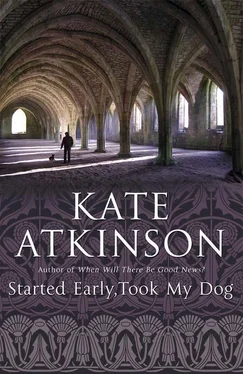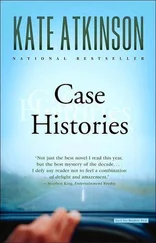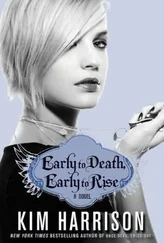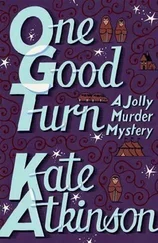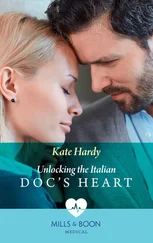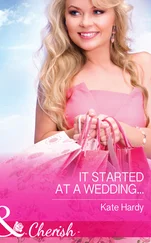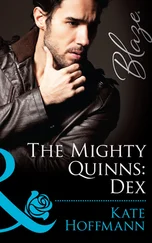Tracy couldn’t think of these Sunday outings without remembering what it felt like to craze a boiled-egg shell and peel away the membrane from the solid greyish white beneath. Sick-making. She suddenly remembered how her father would sometimes pop an egg whole into his mouth, like a conjuror, and part of the young Tracy had expected a dove or a row of flags to emerge in place of the egg. They had seen something similar once in a summer show in Bridlington. Top of the bill was Ronnie Hilton, long past his heyday but nonetheless a Yorkshireman and therefore someone to be proud of.
Tracy ’s father was a war veteran, the Green Howards, landed on Gold beach on D-Day. He must have seen things but if he had he never said. Sometimes a war was wasted on people. He was born in Dewsbury. Shoddy capital of the world. It said something about a mill town that it couldn’t aspire to even second-rate cloth, weaving instead the lowest quality from rags and shreds. A filthy trade, shoddy. A town where now women drugged and kidnapped their own kids for money. The Ripper was questioned in Dewsbury after being caught in Sheffield. Routine patrol, his luck running out, theirs running back in, late in the day. Tracy remembered being in a corner shop when she heard the news, buying crisps and chocolate for her and her partner. On the beat. The bloke behind the counter had the radio on and when the news came on he yelled, ‘They’ve caught him, they’ve caught your Ripper!’ He was second-generation Bangladeshi and Tracy didn’t blame him for denying ownership of Sutcliffe. She couldn’t remember where she was for all those other newsworthy world events (probably in front of the box, getting the news on the telly), although she was in a TV repair shop buying a new scart lead for her DVD player when she saw the second of the World Trade Center buildings fall. You usually expected Countdown .
On the day of Charles and Diana’s wedding, an event that Tracy would have liked to watch (although she would never have admitted to it), she was co-ordinating house-to-house after the so-called honour killing of a woman in Bradford. Fairytale wedding.
Had the kid ever been to the seaside? ‘Have you ever been to the seaside, Courtney?’
Courtney, mouth stuffed with tuna roll, shook her head and then nodded it.
‘Yes and no?’
‘Yes,’ Courtney mumbled.
‘Yes?’
‘No.’
It was an unfathomable exchange. They would go to the seaside. And pantomimes and circuses and Disneyland Paris. They would go to the seaside and paddle in the waves. Cautiously. Before the kid, Tracy would have thought, sea, sand, beach . Now she thought of little kids being swept away like corks by the tsunami. And let’s not forget that on an average British beach, you could expect a hefty percentage of paedophiles to be out and about enjoying themselves. Beware lone men at the seaside, the swimming baths, the school gates. Play parks, funfairs, beaches – the playgrounds of the paedos. Everything that should be innocent. If people only knew. Did the kid know? Did Tracy need to add a therapist to the list of specialists she’d already mentally lined up for Courtney? Or could fresh air, green veg and Tracy ’s love (however amateurish and transgressive) do the trick? Good question. What had Kelly been doing with the kid if she wasn’t her mother? Minding her on behalf of something or someone sinister. Was the kid used to being handed around? Trafficked? Tracy shuddered at the thought.
She should buy a camera, state-of-the-art digital, so she could start preserving the kid’s new life in inkjet. It would look better if there was evidence of her existence in Tracy ’s own life. She had an old camera somewhere, nothing as slick as the ones you got nowadays. There hadn’t been much point in using it, she hadn’t encountered much of anything worth photographing. She mostly went on solitary outings and there was no pleasure to be had from views of landscapes with no people in them. Might as well just buy a postcard.
Tracy ’s father – wore the trousers, wielded the camera – had documented their lives for years. He had been in the habit of taking a photograph of the Christmas tree every year. There were other photographs of the family, opening presents, drinking a decorous sherry, even pulling a cracker, in which parts of the tree, a swoop of tinsel, a drooping branch, might feature but not The tree, the whole tree and nothing but the tree . Not a joke, not even a witticism.
Most of those photographs were jumbled with others in a box in Tracy’s back bedroom, no way of knowing which Christmas a tree belonged to, only the same uninspiring baubles every year in slightly different arrangements, the tinsel star on top, more like a ragged starfish than a star to guide wise men by, and the exhausted pipecleaner gnomes perching drunkenly at the ends of the branches, the tips of matches for noses and eyes. When Tracy ’s parents reached seventy her father ceased buying a tree. ‘Why bother?’ her mother said when Tracy came round on Christmas Day. Cheer and merriment, something lovely, Tracy thought, but too late for any of that.
If she sifted through the box with an archaeologist’s vigilance, Tracy wondered, would she find some clue as to why her parents had embraced their drab lives with what could only be called enthusiasm?
Would she find her younger self in that box and be surprised at how far she had come, or be depressed by the distance between? Ronnie Hilton at the Spa Theatre and a lifetime ahead of her. ‘A Windmill in Old Amsterdam’. Pass the parcel. It was funny, Tracy had spent a lot of time trying to put her lacklustre childhood behind her (where it belonged) but ever since she’d come into possession of the kid she kept being reminded of it, shards and chips of memory. The mirror cracked.
‘Time to move. Why don’t we go to the lake and feed the ducks?’ There were some crusts left from their picnic, the kid had polished off everything else. Perhaps Tracy had kidnapped a cuckoo, a giant’s child. She would pay for that, imagined the kid growing bigger and bigger, puffing up until she filled the car, the spare room, the whole house, eating up everything in sight, including Tracy. Kidnap what looks like a kid and find out too late that it’s going to be the death of you. Like Greek tragedy. She had been to a production of Medea at the West Yorkshire Playhouse a few years ago. An African production, ‘Nigerian, Yoruba, actually,’ her theatre companion said knowledgeably. The academic from the singles social club again. You had to wonder about the educated classes. He tried to grope her on her doorstep. She felt insulted that he thought she was so desperate she would have even considered it. She kneed him in the balls, showed him the kind of empiricist she was. That was it for the club as far as Tracy was concerned.
Of course with Medea it was the other way round, she killed her kids, she wasn’t killed by them. As a plot, Tracy didn’t find it shocking, it happened all the time.
The ducks had no appetite, half of Leeds already seemed to be out, tossing the remains of their sliced whites to the indifferent wildfowl. The rats would be out later to mop up the soggy leavings. Courtney, clearly not one to waste food, ate the crusts herself.
Courtney was drooping. Kids should come with wheels attached.
‘How about an ice cream?’ Tracy said. Courtney gave her the thumbs-up. Tracy wanted to give the kid everything, but all the ice creams in the world weren’t going to make up for Kelly Cross and whatever horrors she represented. Ice cream, ice cream, I scream for ice cream .
They walked back across Soldier’s Field, both of them clutching a cornet, strawberry for Courtney, mint choc chip for Tracy. The Ripper had attacked two victims in Roundhay, one lived, one died. Luck of the draw. ’76 and ’77. Two years after the Lovell Park murder. They never connected that to the Ripper, but it made you wonder. Wilma McCann, his first victim, was murdered only six months after Arkwright had broken down that door in Lovell Park, and before that Sutcliffe had been practising. Arkwright told Tracy that he had heard that someone had confessed to Carol Braithwaite’s murder in prison and then had died. Seemed a convenient sort of way of clearing up a crime.
Читать дальше
